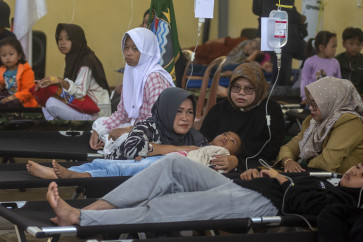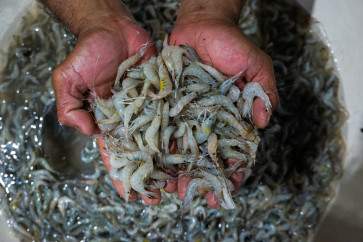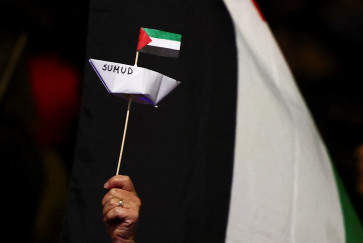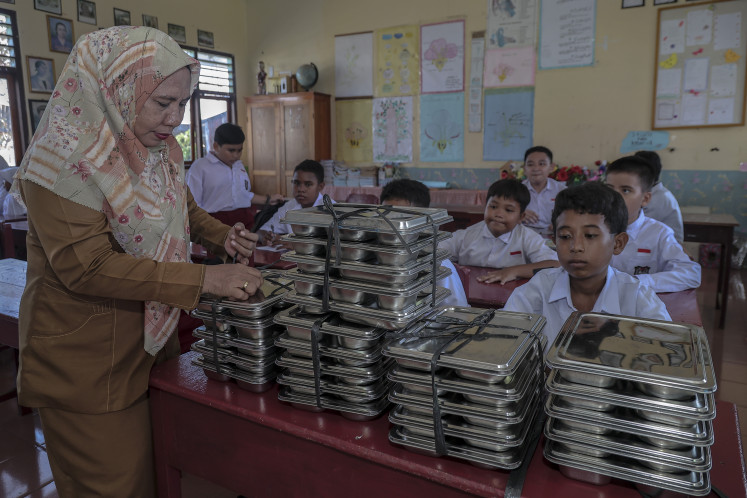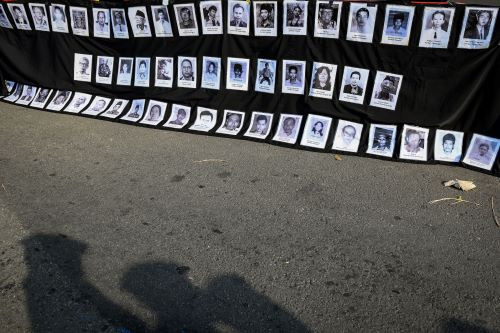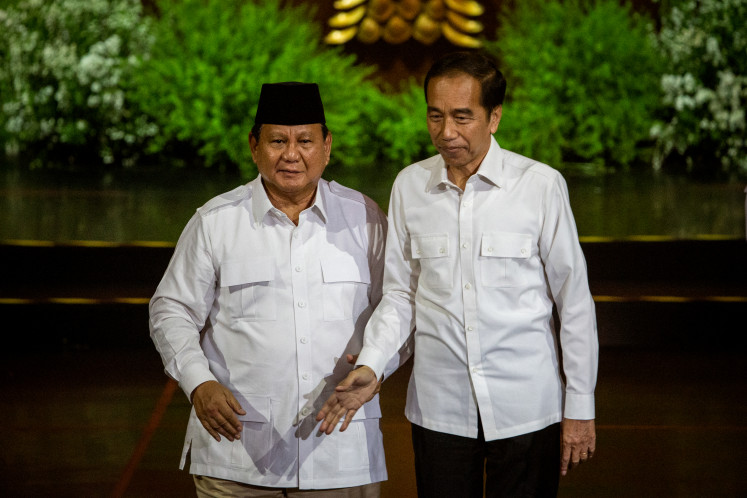Popular Reads
Top Results
Can't find what you're looking for?
View all search resultsPopular Reads
Top Results
Can't find what you're looking for?
View all search resultsPapua: A high-stakes pawn?
Demanding Freeport's exit: Activists from Repdem, a non-governmental organization that fights for democracy, stage a protest in front of PT Freeport Indonesia in Jakarta on Wednesday
Change text size
Gift Premium Articles
to Anyone
D
span class="caption" style="width: 378px;">Demanding Freeport's exit: Activists from Repdem, a non-governmental organization that fights for democracy, stage a protest in front of PT Freeport Indonesia in Jakarta on Wednesday. They demanded Freeport's exit from Indonesia, claiming that the American company had brought suffering to Indonesians, especially Papuans. “There is no alternative to our reliance on the Indonesian Military [TNI] and police”, Freeport chairman James Moffett wrote to the New York Times in 2005. All issues related to security support, Moffett said, were “ordinary business activities.”
Ordinary activities that have led those who held power in Jakarta, such as politicians and police and military generals, to foster deadly conflicts for years.
Recent allegations that Freeport Indonesia paid TNI and National Police officers several millions dollars to guard its Grasberg mine provide only a glimpse of a much bigger payout from the US copper and gold giant that Jakarta has long been eyeing.
Otto Syamsudin Ishak, a senior researcher focusing on Papua at Imparsial, said here on Wednesday that the debate on “meal money” paid to Indonesian state security forces to guard Freeport sites was an effort to distract public attention from Jakarta’s huge conflicts of interests, both economic and political, in the province.
The real clashes were currently between Papuan political groups, big Indonesian businesses and the government, with all trying to destabilize the province so that, for instance, more police officers or TNI members would be deployed.
Such moves might have been made to bolster Indonesia’s bargaining position with the US company at the expense of native Papuans, some of whom were members of the Free Papua Movement (OPM), Otto said.
“Conflicts are sometimes engineered to serve the interests of certain groups in Jakarta, or exposed to hide the real disputes between Jakarta’s powerful groups,” Otto, who also heads the Academics Forum for a Peaceful Papua, said.
The “meal money” controversy was one example of Jakarta’s several conflicts of interest in Papua. In this case, Otto said, the conflict involved two powerful forces: The National Police and the TNI.
According to financial reports, the company’s spending on “meal money” increased significantly from US$8 million in 2008, to $10 million in 2009, to $14 million in 2010.
The “vital object” protective status given to Freeport’s mining site in Papua was also abused to justify sending more police officers and military troops to “secure” the site, where larger detachments and escalating conflicts were used to extract more security funds from Freeport, according to Otto.
National Police spokesman Insp. Gen. Saud Usman Nasution denied the allegations. “There is a presidential decree stipulating that Freeport’s Grasberg site is an important national asset that is subject to high-level security measures,” he said.
Otto, however, played down the security funds dispute, saying that there has been competition in Jakarta that might involve extracting far larger sums from Freeport. “It’s a plan to renegotiate Freeport’s work contract,” he said.
The contract, signed between Freeport and the government in 1991 and set to expire in 2021, no longer contains stipulations obliging Freeport to divest its shares.
Amid a public outcry, the government proposed renegotiating the contract to include, among other things, language requiring Freeport to release some of the shares in its local subsidiary to Indonesian companies.
Energy and Mineral Resources Minister Jero Wacik confirmed that the government would renegotiate the contract, but only after the labor disputes in Freeport ended.
Otto said the contract talks might be driven by politics. “The renegotiation plan has led to competition among Jakarta’s political groups. Things have been hot since the plan might be part of the political parties’ race to collect money ahead the 2014 general elections.”
Otto said that President Susilo Bambang Yudhoyono’s recent Cabinet reshuffle might also have resulted in political deals on a Freeport divestment plan.
Critics have said that a company belonging to the family Golkar Party chairman Aburizal “Ical” Bakrie has been eyeing some Freeport shares.
Lalu Mara Satriawangsa, a Golkar executive and Bakrie family spokesman, denied the claim. “I just talked to Pak Ical and he said that it was completely not true,” he said.
The stakes are high: Freeport is digging up about $40 billion in copper and gold in Papua. The company has estimated it would be at the Grasberg mining site until 2041.
On the contract renegotiation, Freeport Indonesia spokesman Ramdani Sirait said that the company had been attempting to transfer a 9.36 percent stake to the Papua provincial administration.


